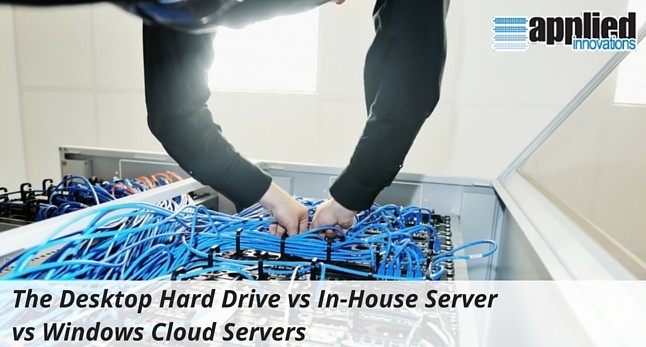To some, the idea of desktop computer hard drives being a form of data storage that competes with windows cloud servers seems a bit of a stretch. As far-fetched as this seems, it’s nevertheless true. Small businesses such as restaurants, stores, and independent contractors often store their data on their computers.
The same is true of many small cash-strapped start-ups where a few people work in an office with their desktop computers linked together for file sharing. Data is stored within the files produced by their applications. Provided these files are backed up, the network of linked computers, otherwise called peer-to-peer networks, suffices. When another person joins the start-up company, her computer is added to the network.
The Difficulties of Linked Computer Hard Drives
Despite their expediency, peer-to-peer networks of hard drives are difficult to scale. File version control for example, is difficult enough with four or five people on the network. When there are hundreds of people passing copies of a file around, modifications are inevitably made. This means that multiple versions of a file with the same name exist on the network. Which file is the correct one? That is, on which file do you base your business decisions?
Access to some of the files on another’s computer requires access privileges to that computer’s files. This leads to security problems when multitudes of people on a big network have access to the others’ computers. Multiple copies of files across the network is also an inefficient use of memory.
The In-House Server
Server-based networks lack many of the problems of peer-to-peer networks. All files and data are kept on a server. Since all the company’s information is in one place, version control is simplified. Files or data on the server can be edited, one person at a time, by those with permission to do this. Others will either have read-only access or no access permission at all. This means that individual computers become secure and private again because the need for multiple access to any single computer by multiple people no longer exists.
Provided they are sufficiently large, in-house servers scale well. However, the more dependent on the server data your business becomes, the more you have to lose should the server become damaged, destroyed, infected, or hacked. Adequate security will require server maintenance by qualified IT professionals and safe areas with the right environmental controls. If the server hosts a website or if the data is otherwise accessible through the Internet, the server will require the appropriate security measures.
Windows Cloud Servers
Outsourcing your data storage needs to specialized data centers with windows cloud servers means you will benefit from their infrastructure, IT staff, and other specialists. Getting identical resources for one’s own use is prohibitively expensive for most small businesses. However, outsourcing means that this cost is spread out among the many businesses using the data center. A small monthly fee gives you access to the kind of resources that used to be available to only the largest corporations.
Data centers use ultra high-performance systems that smaller businesses can’t afford. This means you benefit from their exceptional speed, reliability, and uptime. Furthermore, their experienced and specialized staff can get more performance from their hardware than your employee doubling as your IT person can get from your in-house server. They also have redundant resources and backup systems in place. This gives them an exceptionally high level of fault tolerance. Component failures and weather events do not cascade into system wide failures that affect their service.
If you want access to windows cloud servers with a guaranteed uptime of 100 percent, contact us at Applied Innovations. We are happy to answer any questions you have about our cloud services.
